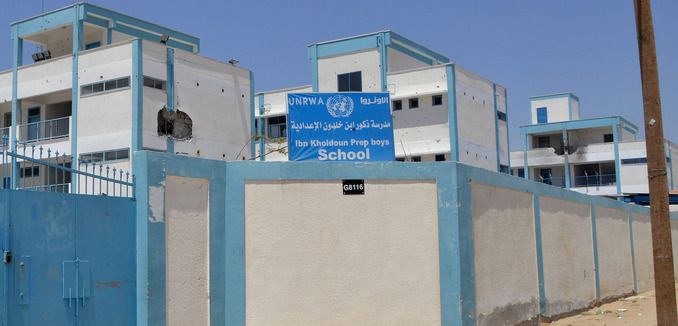The Trump administration announced on Tuesday that it was conditioning roughly half of a periodic contribution to UNRWA (the United Nations Relief and Works Agency for Palestinian Refugees in the Near East). The administration will transfer roughly $60 million immediately, but the remaining pledge of $65 million has been withheld “for future consideration.” The administration had previously indicated that funding would be withheld in response to a lack of movement towards peace by the Palestinian leadership.
Lawmakers from across the political spectrum have long called for reforms to UNRWA and moved to cut funding. Rep. Eliot Engel, a top Democrat of the House Foreign Affairs Committee, said in 2010 that UNRWA has “perpetuated” the plight of Palestinians by keeping them in refugee status.
In 2014 Sen. Ben Cardin (D-Md.), Sen. Marco Rubio (R-Fla.) and then Sen. Mark Kirk (R-Ill.), wrote a letter in 2014 to then U.S. Secretary of State John Kerry accusing the U.N. agency of bias and characterizing its role in the conflict as “troubling.”
In 2015, Congresswoman Ileana Ros-Lehtinen (R-FL), Chairman of the House Foreign Affairs Committee’s Subcommittee on the Middle East and North Africa, introduced the UNRWA Anti-Incitement and Anti-Terrorism Act to hold the agency accountable for ties to Hamas, support for incitement and anti-Israel bias, a follow-up to the U.N. Transparency, Accountability, and Reform Act of 2011.
UNRWA has long been accused of ignoring its mandate to alleviate the plight of Palestinian refugees and instead promoting incitement against Israelis, including even sheltering terrorists. With their actions, the organization has directly facilitated terrorism.
UNRWA has filled high level positions with senior Palestinian terrorists, including Hamas members such as Suhail al-Hindi. UNRWA facilities are also used for Palestinian terrorism. In December 2017, a terror tunnel was discovered under two UNRWA schools. During the 2014 Gaza war, at least three Hamas weapons caches were found in UNRWA facilities, while a Hamas terror tunnel was found in a booby-trapped UNRWA clinic.
The organization’s staff in Gaza, Lebanon, Jordan and Syria has also been embroiled in incitement of terrorism and antisemitism. In February 2017, UNRWA launched a global fundraising campaign using a photograph of a child in war-torn Syria, giving would-be donors the false impression that the scene of destruction is in the Gaza Strip.
UNRWA officials further promote incitement against Israel. The NGO watchdog group UN Watch published two reports just last year – one in February 2017 and a second one in April 2017 – detailing more than 60 examples of UNRWA educational staff engaged in incitement on social media: by “celebrating the terrorist kidnapping of Israeli teenagers, cheering rockets being fired at Israeli civilian centers, endorsing various forms of violence, erasing Israel from the map, praising Hitler and posting his photo, and posting overtly antisemitic videos, caricatures, and statements.”
Schoolbooks used in UNRWA facilities in Gaza and the West Bank have been found to display extreme anti-Israel and anti-Jewish sentiments. In one textbook, Zionism is described as a colonialist ideology devoted to moving European Jews to Israel and displacing Arabs. The textbooks also teach that Jewish holy places—including the Western Wall, the Cave of the Patriarchs, and Rachel’s Tomb—are actually Muslim holy sites that Jews are appropriating.
In addition, UNRWA is perpetuating the refugee crisis by using a unique criterion for defining Palestinian refugees. A recent census by the Lebanese government found that the number of Palestinian refugees in the country is only 38% of the 450,000 UNRWA claims, drawing renewed scrutiny regarding the agency’s commonly-cited total of 5 million refugees across the region
UNHCR, which is tasked with dealing with the world’s refugees (aside from Palestinians) in 110 countries, has a staff of less than 7,000, according to latest available figures. In contrast, UNRWA, which is responsible only for Palestinian refugees has over 30,000 employees.
An internal UN audit in 2010 found that UNRWA was particularly vulnerable to “misappropriation, graft and corruption” in its “procurement, partner selection, food and cash distribution, hiring and promotions, and other areas.” The U.N. audit also found that UNRWA’s oversight arrangements were deficient.
[Photo: Alberto Hugo Rojas / Flickr]




